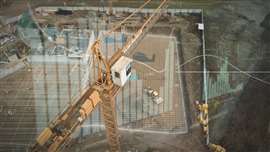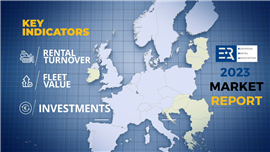Rental confidence taking a dip
01 February 2024
Survey from the rental market indicates a softening of business sentiment across multiple measures, although there is no collapse in confidence. Murray Pollok reports.
 The RentalTracker survey shows that business conditions are deteriorating, although not dramatically. (Photo: Adobe Stock)
The RentalTracker survey shows that business conditions are deteriorating, although not dramatically. (Photo: Adobe Stock)
The RentalTracker survey completed in 2023 was jointly organised by ICST sister magazine International Rental News (IRN) and the European Rental Association (ERA).
A key finding was that Europe’s equipment rental industry seems to be unsure about whether business conditions were improving or worsening. The survey shows clearly that business conditions are deteriorating, although not dramatically, and with less positivity for the future than there was even three months ago.
By almost every measure, business sentiment has decreased. Asked about current business conditions, there was a negative balance of opinion – more people expressed a downbeat view than a positive one – for the first time since the first quarter of 2020 (no need to remind you of what was happening then).
The negative balance is just -5 per cent but extends a steadily downward trend that began at the end of 2021.
Activity continues to grow but at a slower rate.
Utilisation falters
When it comes to time utilisation, there is still a positive balance of opinion on whether utilisation is increasing, stable or decreasing, with a balance of +14 %. Just less than a third of respondents were reporting improving utilisation, but almost 70 % were seeing stable (52 %) or declining (17 %) equipment usage.
That is not a bad position to be in as an industry, even if sentiment has been much more positive in the last two years.
Responses on fleet investment make interesting reading. More than 33 % expect to invest more this year but the proportion expecting to spend less has increased from 16 % to 26 %.
The shift in sentiment is greater for next year. The balance of opinion on spending remains positive at +1 % (that is, more people say spending will increase than decrease, although only by a tiny margin). More rental companies, however, are saying they are likely to spend less next year (27 %) than three months ago, when the figure was just 7 %.
Employment trends
Intentions regarding employment is a complicated matter because the backdrop is a general shortage of labour in many sectors. This means recruitment efforts are ongoing continually but they are combined with a softening of business sentiment.
In the case of the RentalTracker, this is manifested in a larger number than usual – 58 % - saying they would not be adding staff in Q3 2023.
What can we say about individual countries? France and the UK are at the bottom of most of the metrics, while Spain remains the most positive. It is also UK companies that hardened their CapEx plans for 2023, with just 13 % expecting to spend more than the previous year.
It is worth adding, to conclude, that a survey like this can sometimes paint an unrealistically bleak picture: a majority of indicators may be going down but, in some cases, the fall is small and in others they are falling from relatively high levels.
So, it would be fair to characterise the findings of the ERA/IRN RentalTracker as a moderating of conditions, with spending and recruitment plans becoming more conservative. There is not a wholesale collapse in confidence.
European conditions
 The ERA’s latest report shows the economic environment is shifting demand to usership over ownership. (Photo: ERA)
The ERA’s latest report shows the economic environment is shifting demand to usership over ownership. (Photo: ERA)
When the European Rental Association (ERA) released its 2023 Market Report recently, it showed that higher borrowing costs and still elevated inflation are taking their toll on activity. High machinery purchase prices and uncertainty about the economic environment is shifting demand to usership over ownership, so the rental market is expected to outperform the construction sector.
Subdued eurozone economic growth, less favourable financing conditions, reduced business confidence and inflation will also weigh on investment. The residential sector will remain the main drag on overall growth, while infrastructure projects supported by the EU’s Recovery and Resilience Fund should support the rental market going forward.
In the longer term, the diversification of the industry away from construction and investments in green projects will benefit the sector growth.
American perspective
 Jeff Crotto, ARA president. (Photo: ARA)
Jeff Crotto, ARA president. (Photo: ARA)
When asked about the key challenges for rental management businesses in 2024, Jeff Crotto, president of the American Rental Association (ARA), says, “The two main challenges I see for businesses moving forward is how we integrate technology more into how we do things. There is so much technology available out there, whether that be the innovations in rental software, RFID technology, increased mechanisation that makes our delivery teams more efficient, or how can artificial intelligence (AI) be leveraged.
“These are all issues we need to address in 2024 and beyond. This is a place where our network of ARA friends will come in handy. The other challenge is that for our entire history, we have been chasing others and I feel like we are now in a place where our competitors are coming after our clients and being more aggressive to earn their business. We have to be mindful of this and work even harder to earn our clients’ loyalty.”
STAY CONNECTED


Receive the information you need when you need it through our world-leading magazines, newsletters and daily briefings.




